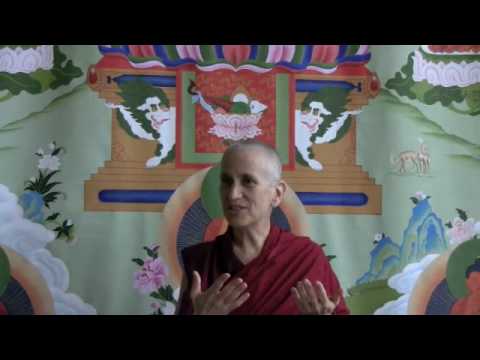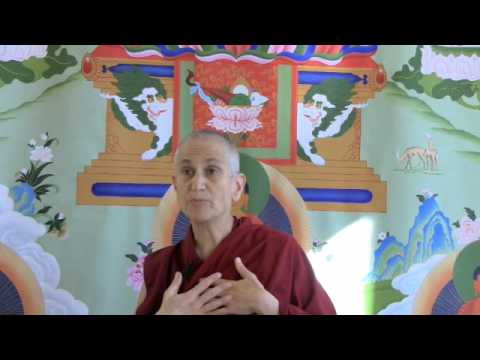Seasons change
Part of a series of Bodhisattva's Breakfast Corner talks given during the Green Tara Winter Retreat from December 2009 to March 2010.
- Using the changing of seasons to reflect on change and impermanence
- How labeling a day the first day of winter can be used to reflect on how things are merely labeled
Green Tara Retreat 008: Equinox and change (download)
Happy first day of winter! Today is the solstice. I think there are a few Dharma lessons we can learn from it. First of all, everything is changing. So while the days have been getting shorter, starting tomorrow they’re going to start to get longer again.
If we look at our life, everything is changing like that too, isn’t it? Whatever mood we’re feeling, it’s going to change. If you’re in a bad mood—it’s not going to last forever. If you’re in a good mood, well, if you practice Dharma it’s going to last longer, until you completely eliminate all the afflictions, then you don’t have to worry about it going away. But if you’re an ordinary being with afflictions, then your good mood is also going to go away. If we have this perspective on things, that we don’t expect them to always be the same, then it really revolutionizes our way of looking at the world.
You can see how stuck we get when we expect things are always going to be the same. For example, right now we’re not getting along with somebody, “Oh, well, that means we’re never going to get along with them. It’s doomed! It’s horrible! I’m depressed because there’s no hope at all for ever changing that relationship.” We just get stuck in that view, don’t we? Or we think, “Oh, this person’s fantastic! It’s the most wonderful relationship in the world! I’m going to be eternally happy forever and ever.” You expect that to happen and kerplunk!
If we expect that things are going to change, that nothing’s going to remain the same, then when change happens we don’t get so moody about it. We aren’t so reactive to these kinds of things. Instead, we just accept them and know that whatever change comes, that also is going to change. I think this just makes our mind a lot more flexible, a lot more peaceful. You feel well today? Well, you won’t feel so well tomorrow. You don’t feel well today? You’ll feel better tomorrow. Instead of getting stuck in how I feel as being everlasting, permanent reality, or expecting the people around us to live forever, or expecting ourselves to live forever. As soon as we just get over this thing of grasping onto permanence, life becomes much easier.
So on the solstice we mark this as if impermanence happened today, as if the days are starting to get longer today. Actually, if you look at it, the days were already in the process of starting to get longer last month when they were getting shorter because each day last month we were getting closer to the solstice when they would start getting longer. They were already starting to get longer even when they were getting shorter. Do you get what I mean? Think about it.
That’s one thing to think about regarding the solstice. The second thing is that today is the official beginning of winter. Now isn’t that a good example of things being labeled arbitrarily. The shortest day of the year is the day we call the first day of winter. Now you could have made it yesterday with the shortest day starting winter, or you could have made it tomorrow with the longest day starting winter. But we just decided it was going to be today. Completely arbitrary, isn’t it? If you think about it, we should have started winter about a month ago because the coldest time is from the end of November to the end of February. That’s the coldest and that should be called winter.
Do you see how things are merely labeled in some kind of arbitrary way? But, since all of us agree on the meaning, it functions like that. We understand each other and we can talk about when winter is, and so on and so forth. I think there’s a lot to learn just from a simple example of the equinox.
Relate our arbitrary description of today as the first day of winter to the word “mine” and how what you call “mine” is very arbitrary. We call this body “mine.” Actually this body comes from our parents and it comes from all the farmers who grew food that we’ve eaten. There’s nothing about this body that’s mine. So why do I make such a big deal about it? I just arbitrarily gave it this label and then got really attached to the label.
We can look at anything: my glasses, my clothes, my feelings! That’s a big one, isn’t it? My feelings. All of us Sarah Bernhardts of the world know, “My feelings.” What is “my” about the feelings? There are happy feelings, there are sad feelings, and there are different emotions. There’s love, there’s hate. They’re just different things. What is the “mine” about them? We just gave a label and then viewed that label with some kind of incredible meaning. These are mine; therefore I must be them, therefore—we have our whole series of therefores.
But this is winter. Don’t you understand this is winter? We’re all now supposed to be freezing cold. It was colder a few weeks ago when it was autumn.
What I’m getting at is: we realize that labels are used for functionality, but don’t imbue them with meanings that they don’t have. Don’t project inherent existence onto them. So happy first day of winter! And be warm.
Venerable Thubten Chodron
Venerable Chodron emphasizes the practical application of Buddha’s teachings in our daily lives and is especially skilled at explaining them in ways easily understood and practiced by Westerners. She is well known for her warm, humorous, and lucid teachings. She was ordained as a Buddhist nun in 1977 by Kyabje Ling Rinpoche in Dharamsala, India, and in 1986 she received bhikshuni (full) ordination in Taiwan. Read her full bio.


